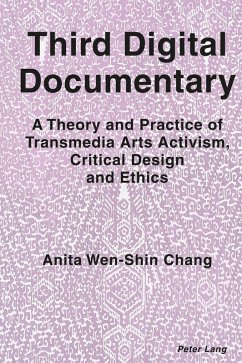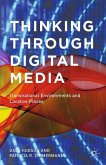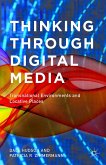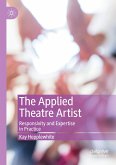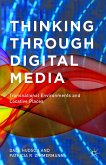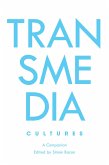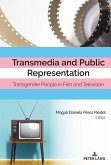This book offers a theory and methodology of transmedia arts activism within the technocultural and sociopolitical landscape of expanded documentary production, distribution, reception and participation. Through a detailed analysis of the author's transmedia project on indigenous and minority language endangerment and revival that consists of the feature-length documentary Tongues of Heaven and the companion web application Root Tongue: Sharing Stories of Language Identity and Revival, she reveals the layers and depths of a critical arts practice when confronted with complex sociopolitical issues while working with multiple communities across territorial/national boundaries. In the context of the growing field of transmedia documentaries, the author discusses the potentials and benefits of a critical design practice and production ethics that can transform this field to pilot new collaborations in documentary and digital media platforms towards a third digital documentary.
«This book is a rousing call to a collaborative documentary and transmedia practice that is at once theoretically astute and ethically committed. As she sets out with her partners to preserve linguistic diversity from Taiwan to Hawai'i, Anita Chang charts a course for community-engaged documentary and transmedia projects that decolonize through the dialogical possibilities of digital media. Third Digital Documentary represents the very best of a growing trend toward the convergence of scholarly, activist, and creative pursuits.» (Alexander L. Fattal, author of Shooting Cameras for Peace / Disparando Cámaras para la Paz)
«Chang shifts debate from how we can preserve languages to how we can create new ones - new, digital, interactive ones that will give fresh life to languages imperiled by global forces of homogenization. Her vision, based on her own work, of an online art platform that moves us from passively absorbing information to actively creating embodied knowledge is a crucial demonstration of how activism can adapt new forms of media to progressive goals.» (Bill Nichols, author of Introduction to Documentary and Representing Reality)
«Chang's book should be very useful to educators, artists and activists as a guide to building counterpublics that discursively vitalize and revitalize spaces of freedom.» (Lana Lin, director of The Cancer Journals Revisted and author of Freud's Jaw and Other Lost Objects: Fractured Subjectivity in the Face of Cancer)
«Chang beautifully articulates the uncharted opportunities and perils of working between stations of identity and history. Dually located in Taiwan and Hawai'i, Third Digital Documentary moves across the terrain of transmedia indigenous theory and praxis. Filmmaker and scholar, Chang champions an ethics of relations informed by a comprehensive engagement with critical practices of feminist film and critical race studies that further trouble the critical territory of post-colonial subjects. The result is a powerful intertwining of indigenous language and cultural analysis in relation to a radical experimental documentary collaboration.» (Beth Coleman, author of Race as Technology and Hello Avatar: Rise of the Networked Generation)
«Chang shifts debate from how we can preserve languages to how we can create new ones - new, digital, interactive ones that will give fresh life to languages imperiled by global forces of homogenization. Her vision, based on her own work, of an online art platform that moves us from passively absorbing information to actively creating embodied knowledge is a crucial demonstration of how activism can adapt new forms of media to progressive goals.» (Bill Nichols, author of Introduction to Documentary and Representing Reality)
«Chang's book should be very useful to educators, artists and activists as a guide to building counterpublics that discursively vitalize and revitalize spaces of freedom.» (Lana Lin, director of The Cancer Journals Revisted and author of Freud's Jaw and Other Lost Objects: Fractured Subjectivity in the Face of Cancer)
«Chang beautifully articulates the uncharted opportunities and perils of working between stations of identity and history. Dually located in Taiwan and Hawai'i, Third Digital Documentary moves across the terrain of transmedia indigenous theory and praxis. Filmmaker and scholar, Chang champions an ethics of relations informed by a comprehensive engagement with critical practices of feminist film and critical race studies that further trouble the critical territory of post-colonial subjects. The result is a powerful intertwining of indigenous language and cultural analysis in relation to a radical experimental documentary collaboration.» (Beth Coleman, author of Race as Technology and Hello Avatar: Rise of the Networked Generation)

